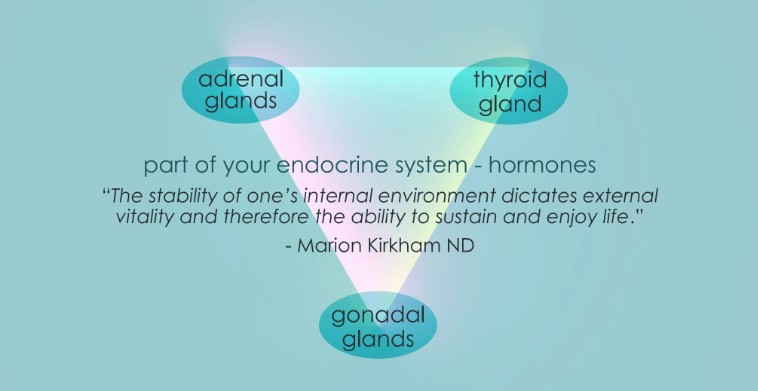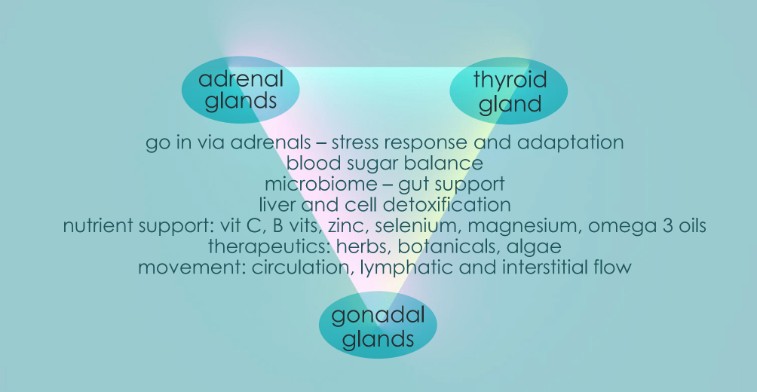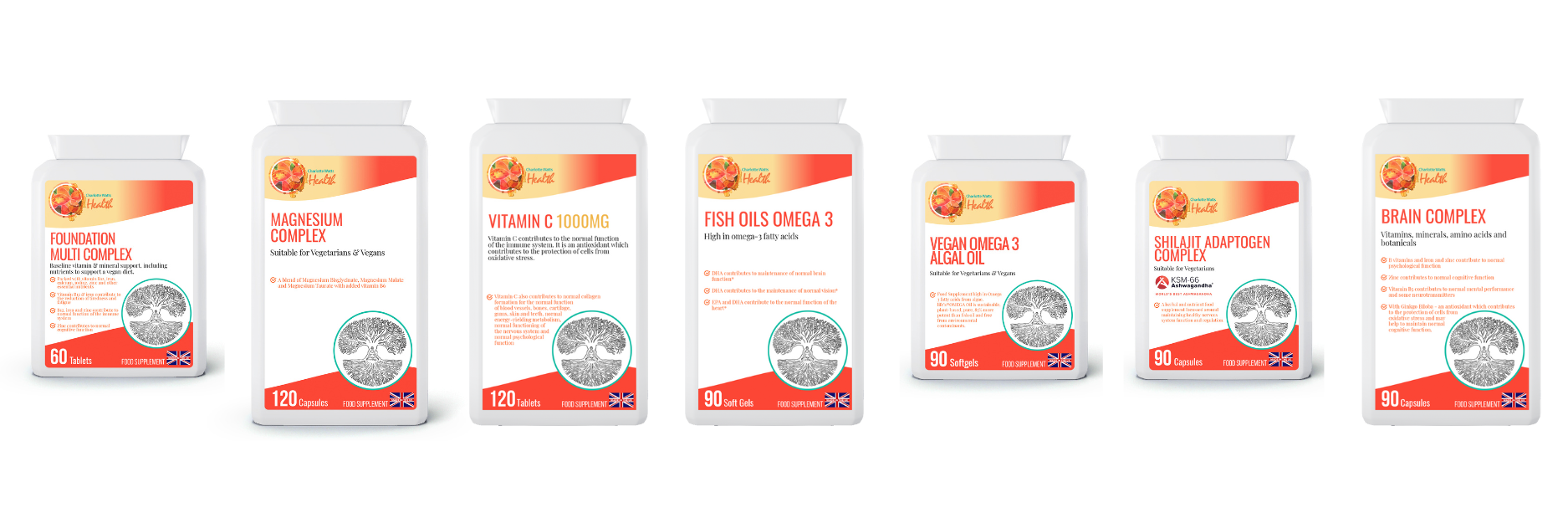Relating Your Adrenal, Thyroid and Sex Hormone Health
Nov 01, 2025After 50 Whole Health webinars and a wealth of information gathered, it feels timely to draw together some key threads. This week, we turn to the intricate balance of the endocrine system - specifically the adrenal–thyroid–gonadal (sex hormone) triangle and how it connects with the brain and nervous system.
Within naturopathy, functional medicine, and nutrition, we often begin by supporting blood sugar balance and the microbiome - two foundational elements that underpin every other system. From this stable base, we can then explore how the adrenals, thyroid, and sex hormones interact, where imbalance might occur, and how to support the body to return to homeostasis.

The Endocrine System and the Nervous System
All of these glands form part of the endocrine system, and all are in continual communication with the nervous system and the brain.
One of my naturopathic teachers, the late Dr. Marion Kirkham, described it beautifully:
“The stability of one’s internal environment dictates external vitality, and therefore the ability to sustain and enjoy life.”
Supporting the different glands within this triangle - adrenals, thyroid, and gonads - has a profound effect across the body. These systems influence everything from energy levels to stress resilience, metabolism, and hormonal balance.
When any one of these systems becomes overactive or sluggish, it can create ripple effects throughout the others.
The Thyroid and Energy Regulation
The thyroid, located at the throat, regulates metabolism and energy. It links closely with sleep–wake cycles and blood sugar balance. It also communicates directly with the adrenals, which produce stress hormones.
Many people experience lower thyroid function (hypothyroidism), while others experience high thyroid activity (hyperthyroidism), often connected to pituitary imbalances.
In times of prolonged stress or trauma, the body may downregulate thyroid activity as a way of conserving precious energy - a survival mechanism that once served us well. In the modern world, with abundant food and constant stress, this can lead to slower metabolism, constipation, weight gain (especially around the upper arms), fatigue, and brain fog.
Cortisol - the main stress hormone - can suppress pituitary function, which in turn slows thyroid activity. Both the adrenals and thyroid rely on the amino acid tyrosine for hormone production. Tyrosine helps form thyroxine (thyroid hormone) and the neurotransmitters adrenaline and dopamine.
Protein intake is therefore vital - foods such as yogurt and other protein sources help provide the tyrosine needed for healthy hormone production.
Supporting the Adrenals First
When thyroid function is low, we always look to support the adrenals first. If adrenal fatigue is present, directly stimulating the thyroid can create a temporary lift followed by a crash.
By supporting the adrenals, we stabilise the stress response, help regulate blood sugar, and create a foundation from which thyroid function can recover naturally.
Blood sugar balance remains a core part of this process - it stabilises energy signalling through the hypothalamus, pituitary, and onward through the endocrine network.
Hormonal Interconnections
The endocrine triangle extends beyond adrenals and thyroid to include female hormones and the reproductive system.
The phrenic nerve, which regulates breathing and heart rate, connects to the ovaries, while the vagus nerve links to the thyroid, highlighting the deep interconnection between breath, stress, and hormone balance.
During times of stress, when cortisol levels are high, the body can begin to ignore thyroid signals. This may even lead to autoimmune conditions of the thyroid, where the gland is mistakenly targeted by the immune system.
High stress also influences sex hormone balance. Elevated androgens (a type of steroid hormone), high oestrogen, and oestrogen dominance are common in menstruating women, especially under chronic stress or during perimenopause.
Entering menopause with adrenal imbalances can intensify symptoms, contributing to energy fluctuations, mood changes, and hormonal instability.
Energy, Resilience, and Adaptation
Those with suboptimal thyroid function often describe life as “passing them by.” This is linked to low levels of DHEA, an anti-stress hormone that buffers the effects of cortisol and supports resilience.
In this way, the adrenals tend to go first, followed by the thyroid, and both influence female hormone levels.
At every stage of a woman’s reproductive journey, from menstruation through menopause, supporting the adrenals and microbiome is key to hormonal balance.

Supporting the Whole Triangle
To support this interconnected system, we focus on:
Adrenal health - managing stress and supporting adaptation.
Blood sugar balance - stabilising energy and mood.
Microbiome support - enhancing gut and endocrine communication.
Liver and cellular detoxification - ensuring hormonal clearance.
Nutrient foundations - including vitamin C, B vitamins, zinc, selenium, magnesium, and omega-3 oils.
Therapeutically, this might include adaptogenic herbs, botanicals, and algae, which support antioxidant defences and resilience.
Movement also plays a vital role - improving circulation, lymphatic flow, and interstitial (cellular) fluid movement.
- Gentle fascial movements support glandular areas
- Softening the jaw and throat for thyroid health
- Releasing tension at the base of the skull and mid-back for adrenal balance
- Encouraging flow through the digestive and reproductive areas
This free movement and “slide and glide” within fascia allow healthy communication between all organs.
Adaptation and Resilience
Ultimately, our health depends on our capacity to adapt - to meet life’s challenges with flexibility and internal balance.
All of these systems, adrenal, thyroid, reproductive, nervous, and digestive, are built to interweave and respond to change. Supporting them allows us to move fluidly through the cycles of stress and recovery that define human life.
This blog is taken from Chapter 7 of my Nine Foundations of Whole Health Natural Health Webinar, which is available to Whole Health Members.
Discover Whole Health with Charlotte here featuring access to yoga classes, meditations, natural health webinars, a recipe database, supplement discounts and more... you can use the code WH100 to try a month for free, then choose from several pricing options to suit you and cancel anytime you need.
These are the supplements featured in the whole webinar from the Charlotte Watts Health range at the shop site. Click on each nutrient to see it there. Whole Health members receive a 20% discount on all products within the shop. See details on joining Whole Health and everything that includes here.





